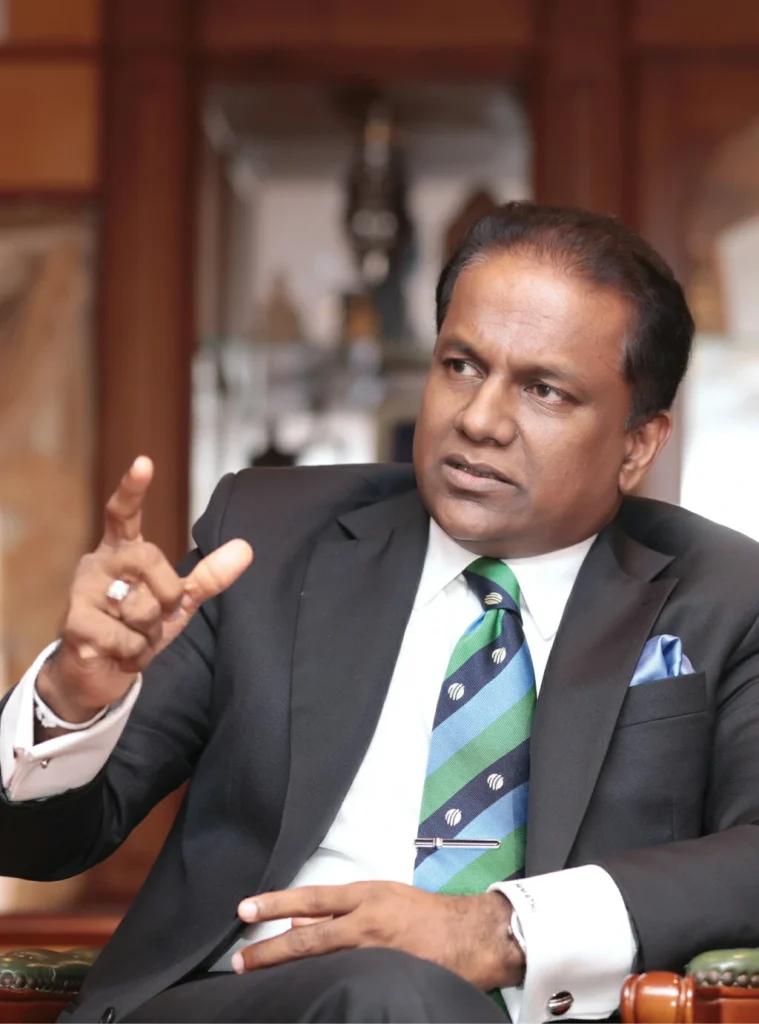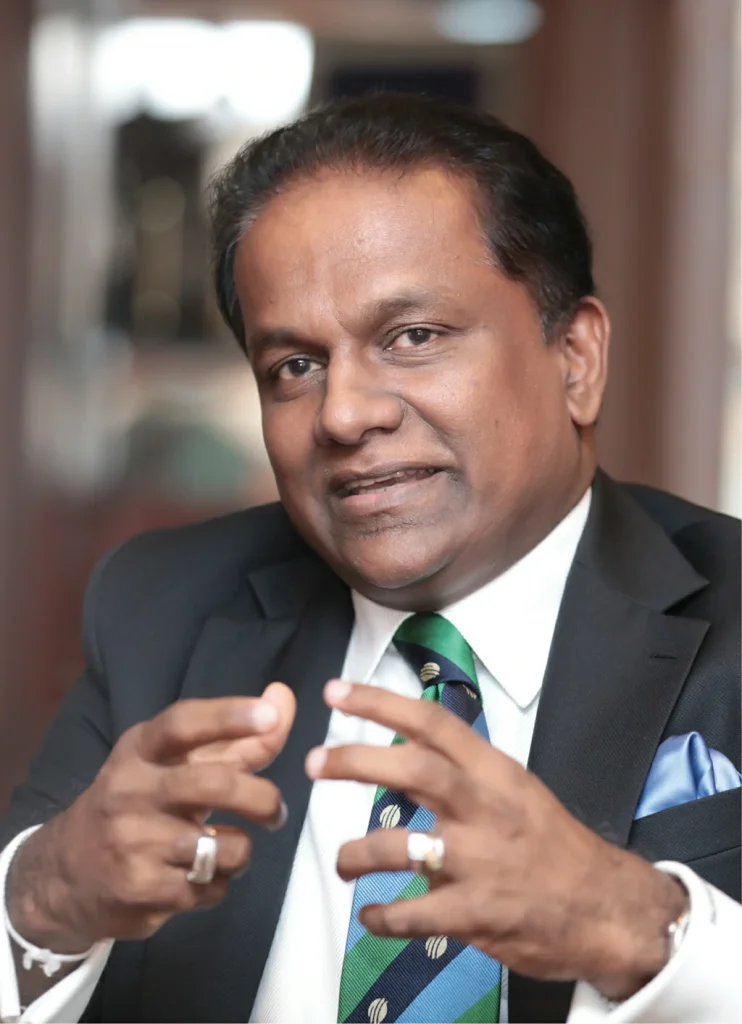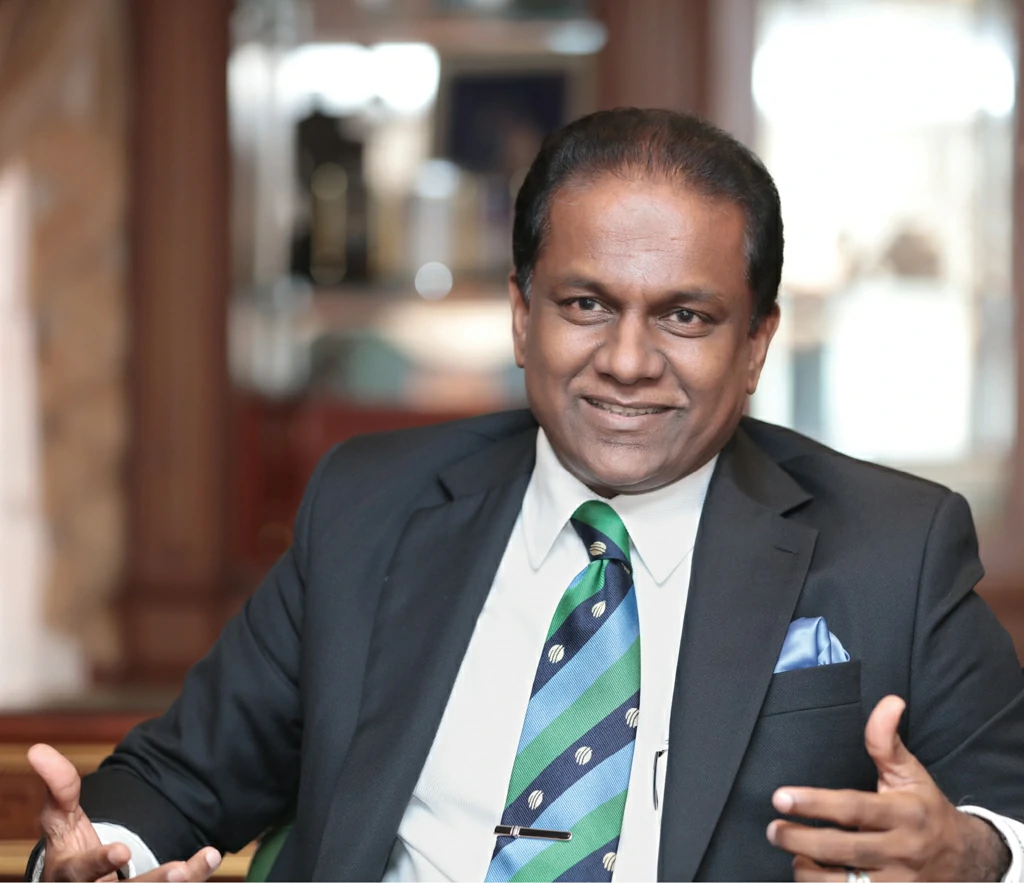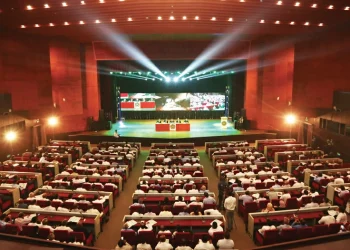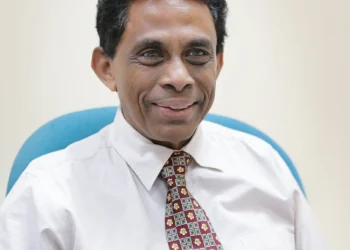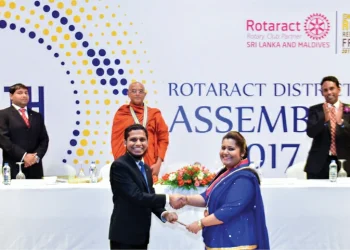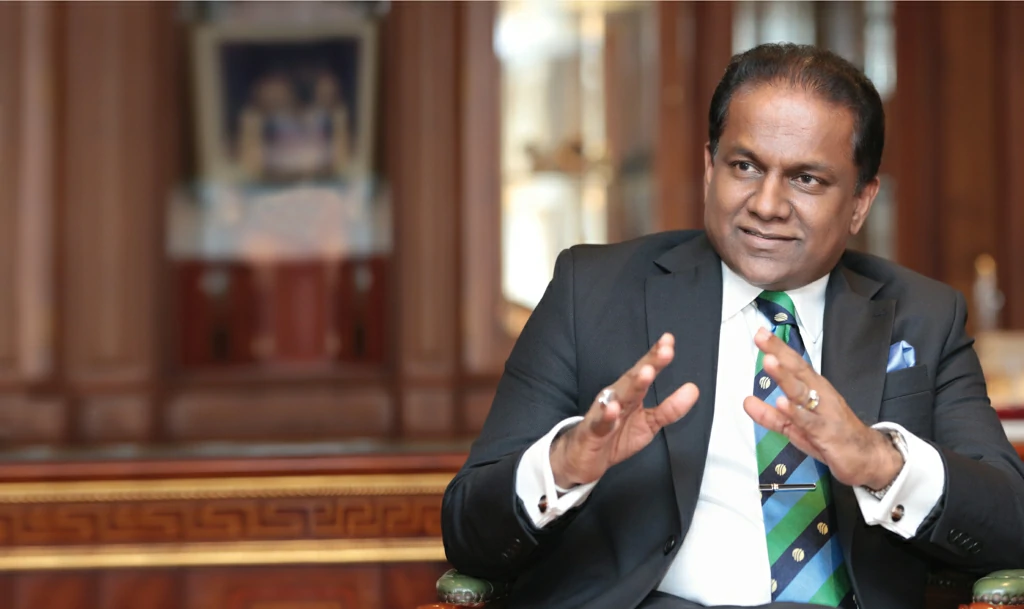
Thilanga Sumathipala, Deputy Speaker of Parliament and President of Sri Lanka Cricket is a firm believer in doing what is best for the country. He has always been vocal on what he believes in while proving that he delivers on what he promises. He is the most experienced active cricket administrator in the country and in fact, perhaps the world. With many achievements in both cricket and politics already under his belt, Thilanga Sumathipala has much more to offer to the country.
By Udeshi Amarasinghe
Photography Mahesh Bandara and Menaka Aravinda
Who is Thilanga Sumathipala?
A disciplined and principled man of integrity, a visionary administrator and an honest politician. A cricket aficionado, a dedicated family man. A leader.
How would you describe yourself as a person?
Disciplined, focused and driven. When I embark on something, I study the subject in depth and find a way forward through a scientific approach. I believe in bringing a professional approach to anything that I do. Professionalism can only be acquired through training; it is systematically built up.
One cannot be a professional unless you are trained to be one. You have to go through a process of education, which structures and cultures a person. I would rather be known as a passionate administrator than a businessman, or politician. I would like to define myself as one of the best administrators this country has ever produced.
I will substantiate what I have said to you. I wanted to be a printer. Therefore, I obtained my first degree, a BA from the London College of Printing, now known as the London College of Communication. Printing and publishing are my first love. I learned about publication and journalism while studying for my degree. I didn’t want to get into printing unless I had some basic knowledge. I then followed a course in management at the Yokohama University, Japan. Then, when I entered politics I went to John F Kennedy School of Government, because I didn’t know enough about public administration and governance, even though I had a passion for it. At the John F Kennedy School of Government, I received the basic tenets of government from the best school of governance in the world. I was able to successfully complete my Masters in Public Administration and afterwards I entered politics and was elected to Parliament.
I Would Rather Be Known As A Passionate Administrator Than As A Businessman, Or Politician. I Would Like To Define Myself As One Of The Best Administrators This Country Has Ever Produced.
I do not believe that there is anyone else in Parliament who has obtained a Masters or BSc in Public Administration. We need to know about public administration as we are working within the legislature, and when you are in Parliament you need to know the role of the legislature; such as passing of ordinances, enactments, resolutions and matters pertaining to the constitution. I have always believed that if you want to excel in a particular field, then you have to get your basics right; obtain the required education, followed by field experience. One must make sure to always follow a professional approach, especially when a solution is required.
If you want to be a top administrator you have to understand where you are, what you are doing and where you are going, make sure you get there in the correct manner.
You have experience as a businessman as well as in the corporate sector. What can you tell us about this?
I got involved in my family business when my father passed away. That is when I was just 15 years old. Subsequently, I completed my university education and upon my return to Sri Lanka I started a printing company and expanded into various segments. We went into passive investments such as the share market. However with my commitments at present, I am not involved in any business except printing, which I love doing.
I was appointed as the Chairman of Sri Lanka Telecom and Mobitel in 2002. I am proud to say I managed to transform the institution to what it is today. We entered the mobile market by acquiring Mobitel, transforming it into a GSM platform and introducing new technology. We formed our own company under the Telecom Rainbow Pages, and launched the Sigiri calling card, ventured into the pre-paid market, and also improved on asset management. We also introduced many initiatives during my tenure.
SLT was the first telecommunication company to be listed in the Colombo Stock Exchange. If not for this transformation period, SLT would have been in difficulty with only fixed lines. At that time SLT did not have any other supplementary assets during the period of consolidation. SLT and Mobitel together have great potential.
You have been involved in Sri Lanka Cricket for many years and you are the current President. What are your thoughts on this part of your life?
The passion I have for the game and my involvement in cricket is a very long story. I have been in cricket administration for 22 years, directly and indirectly. I will continue to be part of cricket in the future as well. I returned to cricket administration after 11 years in January 2016. Many decisions had been taken in the previous years, which are difficult and time consuming to rectify. However, I am confident we can transform Sri Lanka Cricket back into a global force. I need about three years more; the way things are moving now I am confident that we will return to our winning status, achieve financial stability, along with a solid administration and infrastructure.
I Believe I Am The Most Senior Cricket Administrator Currently Serving In The World. My Presence Here Is Not Only Local And Regional, But It Is Also Global.
I believe I am the most senior cricket administrator currently serving in the world. My presence here is not only local and regional, but it is also global. In my current position as President of Sri Lanka Cricket I want to take the sport to the top. In the process of getting there we have to also make sure that we sustain it. Sustainability of Sri Lanka Cricket depends on playing well at the middle and holding on to your current client base, which is our fans; as well as the development of the sport across the country. I believe that every outstanding cricketer born in this country with the talent to play cricket should have a fair chance of representing the country. Our system is in place – district to provincial level, then on to national level. We can achieve that objective. We have to consider how to market, sell and derive an adequate income. Financial stability is very important. We have laid the foundation properly. At the time I was elected as the President of Sri Lanka Cricket, there were many outstanding payments to be settled. After successful negotiations, we are not in debt at the moment. There is no point in harping on the past or the mishaps that occurred because I took on the challenge as the President of SLC with a defined plan to overcome those hurdles.
The national team of course has had its share of problems, which stem from a long time of neglect in certain key areas. I am very confident. Sri Lanka needs only another six months to a year to start showing the results of the changes and enhancements we have effected. We are definitely aiming at the 2019 World Cup. Everything is designed and aligned with the 2019 World Cup. Of course winning is our aim. The Board is going to be stronger than ever; we will be financially strong and very effective, and the tournament structure is going to be absolutely spot on.
We were able to bring the headquarters of the Asian Cricket Council to Sri Lanka last year. It was a huge achievement. There are 25 countries in the Asian Cricket Council. We were competing with Malaysia, Dubai, Singapore and Mauritius. When deciding a location, the ACC looks at the country’s tax structure and other related areas. I had discussed the requirements with Honourable Ravi Karunanayake, who was the Finance Minister at that time and he was extremely supportive. He said this was something we must encourage. In his Budget speech he said as a first step that he would like the Asian Cricket Council to come to Sri Lanka. With the ACC head office being in Colombo we are now on the radar of other international sports bodies to establish themselves in Sri Lanka as well. The ACC head office being here will have a similar effect, which will result in international umpiring, coaching facilities and decision making processes coming to Sri Lanka. The AGM of the ACC will be held in August in Colombo and will be attended by 25 countries, which will be good for Sri Lanka. We have also been invited by the ICC to present a proposal to host the ICC Annual General Meeting here next year.
We Were Able To Bring The Headquarters The Asian Cricket Council To Sri Lanka Last Year. It Was A Huge Achievement. There Are 25 Countries In The Asian Cricket Council.
When you want to portray your country to the world there is a lot you have to do. One way to showcase your country is through events. It can be a concert of an international artiste, a visiting international rugby or football star; but it must be an international event with global acceptance. You have to encourage this in a tiny Island like ours. The Government must go out of its way to attempt to attract such international level events.
Cricket will continue whether we are present or not. It is our responsibility to put the house in order, and the administration in order. You win some games, you lose some, which is alright as long as you play as a country and as one unit. When I took office I found that there was no following, people had no confidence in Sri Lankan cricket. Thus, I felt that it was important to create a feeling and passion for cricket. We launched the ‘one team one nation’ slogan. While there will be 20 million people following cricket in Sri Lanka, there will be more than 20 million people living outside Sri Lanka who will be following the team. They must all rally around one flag, which was the ethos of the ‘one team one nation’ campaign. People follow this adage very strongly. Of course there is a negative reaction when we lose matches; people feel let down and upset over the loss, this only shows how many people are passionate about the game. This fan base must be sustained even when we are not doing well. We must allow people to regain their confidence in cricket by staging good matches. We must support the team, rebuild our team and go forward. Today, we are confident as far as cricket is concerned, Sri Lanka Cricket can be proud of being a well-structured unit in Asia. Globally we will be recognised as a strong and professional body, which will be respected.
Incidentally we will be hosting the Nidahas Trophy 2018 in March next year where India, Sri Lanka and Bangladesh will play a T20 Tournament in celebration of Sri Lanka’s 70th year of Independence. This is also a celebration of the 70th anniversary of Sri Lanka Cricket. We intend to organise a special tribute to the Late Jagmohan Dalmiya, Chairman of BCCI to coincide with the Nidahas Trophy. The late Mr Dalmiya was a great friend of Sri Lanka and stood by us during trying times.
Having been involved in Sri Lanka Cricket for many years, how has the game evolved?
Things have changed greatly since the 95-96 era. Back then, it was only test cricket and ODI and now we have T20. The game is getting shorter as fans are keen to watch a shorter version of the game. The crowd following has increased because the game is shorter. Many countries have started their own domestic tournaments like IPL, CPL and BPL. Except for New Zealand and Sri Lanka, everyone else has their own domestic as well as 20-20 tournaments. We are aiming at 2018 to start our domestic tournament with a different format. Although we initiated the SLPL it was a failure. I don’t want to be a part of something that starts and ends up a failure. We found that the failure of SLPL was due to lack of a domestic structure. We have now established our domestic pathway with age-group cricket being played from school to disctricts, to provincial to super provincial level. We have four centres of excellence – Colombo, Galle, Kandy and Dambulla, which will cater to the full gamut of requirements of creating a world class cricketer. We are building on those four pillars scientifically and through that will develop and sustain the game. The structure will be fully operational within another two years and in the meantime, we have started provincial tournaments; under 15, under 19, under 21 and under 23 provincial tournaments.
As for the future of Sri Lanka Cricket – we have made significant changes to the constitution. We need a more liberal policy for national associations to make their own decisions. We do not mind the Sports Ministry overlooking operations as long as there is freedom to carry out day to day functions of national associations. Once you complete a year, the annual report is submitted for an audit, which they can question. But if you are elected you must have the freedom of running your own affairs. I have been to international forums, where I have found out that the national associations function independently, with minimal political interference. I believe that we have to be answerable, and we have to be accountable – which is very important. But at the same time, the non-interference is important. As I was in cricket administration before I became a politician I can see both sides of the coin. I do not encounter problems with interference today because of my political standing. Today I can diplomatically go forward without any political interference by discussing things as a peer, but the amount of political pressure I got before I entered politics was immense. A national body cannot perform under political pressure to assuage various political aspirations unless one has a degree of clout. Gamini Dissanayake, Tyronne Fernando and J R Jayewardene were successful when they were at the helm of Sri Lankan Cricket. All these veteran politicians used their strength to transform the game. Sri Lanka Cricket Board was very strong during their tenures because they were people who used their power for the betterment of cricket and did not give into pressure. However, there are issues when there is an interim arrangement and when people are political appointees as there is no accountability.
Non-Political Operation Is Important. I Will Not Be Here Forever, So I Would Like To Lobby For Such An Administrative Setup During My Tenure.
I have been with the Cricket Board from 1995. Non-political operation is important. I will not be here forever, so I would like to lobby for such an administrative setup during my tenure. I have no problem with people who have played cricket and involved in politics getting involved in administration.
You have supported the Indian Cricket Board during a tough period. What can you tell us about this?
The ICC and the Board of Control for Cricket in India are having certain issues. India is a key stakeholder of world cricket. If you look at the global arena, India is the most important player. I decided to support India when eight countries voted against its revenue plan at the ICC. I stood by India saying that this is a matter to be discussed internally. Resolution was important because the public should not assume that the Indian Cricket is all about money. India is contributing greatly to the development of the game. I am happy it is now resolved.
Indian cricket brings in more than 65 per cent of the revenue in world cricket. If you consider the resources and the revenue generated by Indian cricket, especially with the IPL, if it is disabled, then all the cricket playing nations will be affected. We know the importance of India. Maha Bharatha is our big brother. We cannot afford to allow Bharatha cricket to be negatively effected at any cost. I will stand by them as I have stood by them in the past.
There Is A Wise Saying From Mahatma Gandhi – To Be The Change You Want To See In The World. This Is Why I Decided Rather Than Sitting On The Sidelines Being Critical Of The Government, That I Should Effect The Change I Want To See.
The Indian cricket administration has come a long way to maintain the sustainability of world cricket. The game should not suffer just because they are having legal issues. That is my position. India is our regional strength. As long as we are together we can blossom, and we can be successful. Wherever possible, I have used my standing as one of the most senior administrators in Cricket to bring everyone together, discuss the issues, and propose amicable solutions. I am happy that India received 400 million dollars over the eight year cycle as opposed to the originally proposed 280 million dollars. I believe that our stand has proven to the ICC as well as to all governing bodies and stakeholders that we will stand by what is correct and steadfastly uphold correct principles.
Why did you decide to enter politics?
I am a successful, happy and content person both in my personal and professional life, so many would ask why the pressure of politics? But I love my country too much to rest on my laurels. Everyone is critical about decisions being taken by the Government and politicians. I felt that since about 100 politicians are making decision for 20 million people, then I too should get involved and work for the people. There is a wise saying from Mahatma Gandhi – to be the change you want to see in the world. This is why I decided rather than sitting on the sidelines being critical of the Government, that I should effect the change I want to see. Democracy is not cheap; it is very expensive and this has not been an easy journey for me I have nothing personal to gain from politics, I am a content and successful man as I said before, Therefore, I decided I might as well go to the frontlines of policy and drive it towards what I believe is right. I may not be right all the time, I am after all human, but if I believe something with my conscience and in principles, I will drive it with all I have, and to do this I have to be in the system because I cannot implement these from the outside.
What can you tell us about your experiences and achievements as a politician?
Currently, my main responsibility is as the Deputy Speaker of Parliament. During my last term I was involved with the Parliamentary Group for Global Action (PGA). There are about 1,200 Members of Parliament internationally, with 120 countries as members. Only 12 board members serve on the PGA once in two years. I was elected to the PGA Board through which we established a ten-point programme, which addresses human rights, rule of law, especially development, with an important focus on the underprivileged and poverty alleviation. I did my own programme for the Parliament of Sri Lanka.
This term, I have submitted a paper to Parliament titled Sustainable Development Goals 2030 (SDGs). The Parliament appointed a Select Committee, of which I was appointed as the chairman. This is a huge and significant undertaking with a long term impact on our future and the generations to come. Sri Lanka needs a National Plan; a plan that is followed by action. There should be KPIs and other indicators. Thus, this Select Committee is my main focus in Parliament right now.
Sri Lanka is the leader in the parliamentary world having taken the initiative to have a Select Committee on SDGs. I have studied the manual of the Inter-Parliamentary Union (IPU), the biggest parliamentary institute in the world and based on that we have localised the SDGs to fit Sri Lanka. This is a great achievement that any Member of Parliament can be proud of.
We was able to localise the SDGs into a structure and organise them into four clusters, 17 goals and 169 targets. We made the four clusters with the agreement of UN agencies. This has not been done anywhere else in the world. When the four clusters were formed I invited Members of Parliament, Niroshan Perera, Buddhika Pathirana, Bimal Ratnayake and Priyankara Jayaratne to lead the four respective clusters. We had a meeting with regard to this with Hon Mangala Samaraweera as the new Finance Minister, and requested him to align the National Budget with the SDGs.
The Government has a great plan for the Budget, which includes several aspects such as education, housing, sanitation, water, equality, empowerment, rule of law and poverty alleviation. Every ministry operates on its own programme. However, if you take a look at each ministry and do an assessment of the budget versus these plans, you willfind an unfortunate imbalance and gap. The national plan may target to reduce poverty by proposing programmes, but the allocations in the National Budget for that particular task will not match the national plan. We are thus providing advice through the Parliamentary Select Committee to identify the gap between the road map and the budget.
We Were Able To Localise The SDGs Into A Structure And Organise Them Into Four Clusters, 17 Goals And 169 Targets. We Made The Four Clusters With The Agreement Of UN Agencies. This Has Not Been Done Anywhere Else In The World.
We have already met Honourable Mangala Samaraweera and the Secretary to the Treasury Dr R H S Samaratunga and discussed with them that since we cannot have all ministries in line with the SDGs right now, to have the top ten ministries to have their SDGs accommodated in the 2018 budget as a start. This way we can gradually start achieving our objectives in three to five years in the short term and five to ten years in the mid-term. We can address issues related to poverty, sanitation, housing, unemployment and more, when we know whether the plan of a particular area is in line with budgetary allocations.
We have prepared and presented and Interim Report to the Parliament and we will complete the main report in about eight months. Then we will know the current status, progress and what more we need to achieve.
Every government should have its priorities and business plan while also making political decisions. We have to assess ourselves in terms of the Asian region, to gauge where we are in terms of every indicator. What is the international standard of where we should be? Should we be a developing country, developed country or an under-developed country? Based on what we want to be, there must be very effective data available for the government. This is an exercise I am very keen to achieve for our children and the future generations.
Our civil society is very quiet. Our people are very quiet. I believe that there are reasons for this silence. I believe the 1971 insurrection, the conflict between 1983 and 2009 and also the 1988/89 troubles have made us backwards as a nation. For decades the people of Sri Lanka have been scared to do anything. We have all been through this since 1971. Hence, it is not easy for you to stand for what you believe in, to argue, debate and stand for your rights.
I am not talking about picketing near Lipton roundabout every day. I’m talking about community dialogue and giving the people a voice. They should be able to have discussions at a community level and decide on what is required for their area with the funds provided. Today, community dialogue and communication are absent. People feel they are not part of the decision making process. We have a great deal of repair work to do. We have to encourage community and grassroots level interaction, discussion, and dialogue. In the past people had a national interest in the development process. People would quite attentively listen to the speech by the President or the Prime Minister, if it concerns a gazette notification or enactment. Society, then, was interested in the people who were involved in the decision making process. There was a reaction from the people, either negative or positive. There was good communication between decision makers and the people. We need to have more and more people of education and intelligence entering politics, people who earn respect and regard, because in their absence it will be a totally unsuitable group of people who would enter politics. Who is to be blamed for this situation? If you let it go, it will go on unabated. If you encourage people to come on board and support them they will make the change and the decision making process over the next two decades. Today people of this calibre are reluctant to enter politics.
The Government Must Get People To Do Business. The Government Should Not Be In Business. Government Must Be A Policy Body Driving Regulation; A Policy Body That Effectively Regulates.
We need our leaders to gain provisional experience by serving local government bodies such as the Municipal or Urban Councils and Pradeshiya Sabha. We need to administer an oath as people’s representatives and know the specific responsibilities. This way leaders are forced to comply with the oath. We have not done such a thing for too long. Can we do it now? Yes, we can. We had to implement these procedures from the beginning. Similarly, if new laws are introduced people will react to it. But you have to be bold enough to decide and implement what is good for Sri Lanka. This will give results.
As a person who has had experience in diverse areas and is a relative new comer to politics, can you recount your experience working with senior politicians as well as within a political party?
First, you must work with a philosophy and an ideology, and what you believe in. If you believe in the party and its policies and politics, then you must transform yourself to fit in there first. Number one will be your party’s principles and policies. I believe in the SLFP as it is a party that takes the middle path. The SLFP is the right place for me, because SLFP understands the poorest of poor, and the richest of the rich. When Hon S W R D Bandaranaike established the party he chose the middle path, which has always been the stance of the SLFP. The SLFP, has also modernised itself with the changing socio-economic climate.
Hon Madam Chandrika Bandaranaike Kumaratunga privatised the SLT. She entered into Private-Public Partnerships, which shows that the SLFP is not an extreme left oriented party. You cannot have a closed economy as we are partners in a global village. While we look at the economic opportunities here, we have to also look at a pragmatic economic plan, and transform this country. If a political party espouses the same ideology that you value, then work with that party and then you become part of the decision making process and you enjoy working with the people. I agree with the economic philosophy of the SLFP. They consider the base value of this country. I am not in agreement with late Hon S W R D Bandaranaike, declaring Sinhala as the official language though, he made a fundamental mistake for which we suffered for 30-40 years. We have to learn from those mistakes. When we look at the National Plan there is expertise in the Government and in the private sector. The Government should be engaged in policy and regulation, not in business enterprise. You have to regulate and drive policy. You cannot be in business and compete with your partner. When the Government sets up a governing board, it must invite the private sector to join in, thereafter gradually through a regulator collect taxes to derive your income. If the Government decides to manage the endeavour, it will be competing with its clients; the client is the business enterprise who is running the economy and paying taxes.
The Government must get people to do business. The Government should not be in business. Government must be a policy body driving regulation; a policy body that effectively regulates. Only then can fair play, fair price, equal opportunity and quality reach the people. We have to find a balance. I am in favour of the Paddy Marketing Board as it controls paddy marketing between 12-15 per cent, which keeps the best price in the market. But we cannot operate the entire industry, the Government business is not buying and selling rice or paddy. It is to be the regulator and a standard control to run the economy.
We Are Blessed With Intellectuals Who Are Educated And In The Private Sector Who Can Assist And Guide The Government To A Different Level.
There are a number of intelligent and knowledgeable people in this country to run businesses. We must make use of them. We are blessed with intellectuals who are educated and in the private sector who can assist and guide the Government to a higher and different level.
If we could have a mechanism where they can contribute more and if the various Chambers are strong then at the end of the day the Government will be forced to consult the Chambers, and ask their point of view and push their position into action.
You have always been outspoken and voiced your opinion. What can you tell us about this?
Being outspoken sometimes can be a disadvantage especially if your leader is not willing to accept your position. Obviously then you become unpopular. I must say I am now more mature than I used to be. I am extremely careful when I communicate what I have to say, which I do in a more diplomatic and also structured manner. I used to be very abrupt and straightforward about my opinions, and very outright about my feelings. But that was not the right thing to do. Today, I will suggest that it is not the right time and to think about it, and put across my views diplomatically and maturely. I think I had many difficulties and disadvantages by being straightforward about matters.
Personally, I have been through many difficulties. My family and I have suffered as a result. But I have voiced my opinion at the spur of the moment because I felt it was the right thing and not for any personal gain. I have said what I have to say and stood by what I have said.
I believe that His Excellency Maithripala Sirisena and Honourable Prime Minister Ranil Wickremesinghe are both diplomatic and democratic leaders who will listen carefully and provide their thoughts after weighing the facts before them. Politically Sri Lanka has a great opportunity to make changes towards the constitution.
I Believe That His Excellency Maithripala Sirisena And Hon Prime Minister Ranil Wickremesinghe Are Both Diplomatic, Democratic Leaders Who Will Listen Carefully And Provide Their Thoughts After Weighing The Facts Before Them.
The composition of the current Parliament is ideal; I do not think I will see a government with a ⅔ majority in Parliament again in my life time. This may be our last chance to make any constitutional changes. I am very keen about electoral reforms. If electoral reforms are passed, we can be sure of seeing people of high calibre over the next ten to 20 years entering Parliament. If the electoral reforms are not passed we cannot then expect the right people to be part of the decision making process in this country. All other matters can wait.
I believe Sri Lanka needs an Executive President with reduced powers. We must have an election that seeks the mandate from all the people in this country to elect their President. Sri Lanka will not have any stability if the Executive Presidency is abolished. Parliament will be de-stabilised if there is no Executive President. If the people are not satisfied with a Government then they have the choice to change it. The continuation of a Government is very significant and important. Parliament today hangs on the Executive Presidency, an Executive President elected by the people. I do not believe that President J R Jayewardene introduced this constitution for nothing. I am not in support of a change in the presidency; I would support a President directly elected by the people. Parliament must not change every few months, especially with the many committees in Parliament.
We have a Constitution Council and a very transparent process. It will take another ten years to see its impact. When the independent commissions function, the results will be in the long-term; no one will be able to abuse the system. In the short term people will find fault. But have we not achieved a lot from where we were? We are yet to see the true meaning of the changes we made to the 19th Amendment. The reason that SLFP joined with UNP is to work together and make the necessary changes. Once the desired electoral reforms are passed, the United National Party can continue its own path, the Sri Lanka Freedom Party can rectify its problems as well and follow its own path. The country must have a road map.
Message to the readers?
As the Deputy Speaker of Parliament and the President of Sri Lanka Cricket I know that the readership of Business Today is unique and very important. Many of them are decision makers, who are at times very frustrated and disappointed with Government decisions. Yet, I must say that the current policy decisions are meant to take the country to the next level of economic development. I am keen that they are supportive of this. I feel I am a part of this leadership and it is a part of me.
I am not a stranger to Business Today, the relationship can be traced back to the 1990s. You have grown as an organisation and are celebrating 30 years. You have grown with the private sector, a voice that matters to this country.
It is my responsibility to address and provide insights, as much as I can, about our plans and to communicate to these very stakeholders what we believe in, what we do and what we intend to do.
